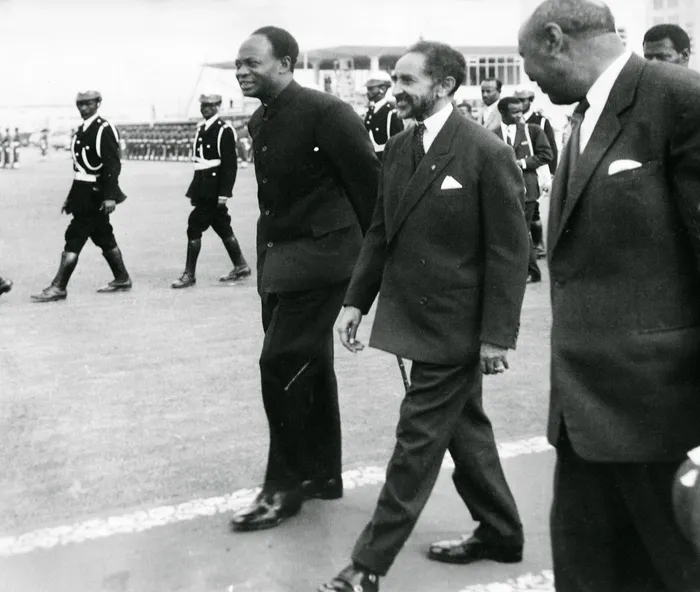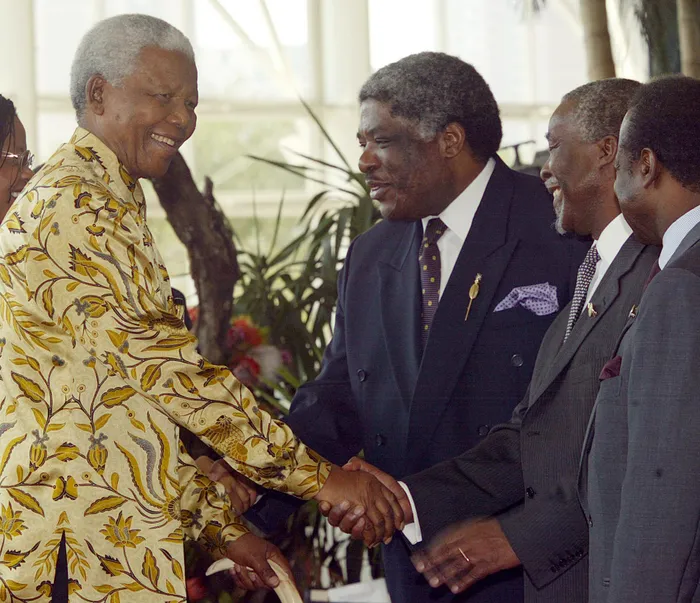Africa Month: Pan-Africanism Doublespeak Retarding Continent’s Progress

Ghana's founder and first President Kwame Nkrumah (left) and Ethiopian Emperor Haile Selassie (centre) at the formation of the Organization of African Unity (OAU) in Addis Ababa, Ethiopia on May 25, 1963. The formation of the OAU is celebrated as Africa Day.
Image: AFP
Dr. Reneva Fourie
EVERY year on May 25, we celebrate Africa Day. It commemorates the founding of the Organisation of African Unity in 1963, a moment born from the fires of anti-colonial struggle and lit by a bold vision of a united, free and sovereign continent.
In 2002, the organisation was reconstituted as the African Union, intended to carry the dream of Pan-Africanism into a new era. But over sixty years since the OAU’s founding, the promise of liberation remains painfully unfulfilled.
Africa is not yet free. Not in the way Patrice Lumumba imagined when he spoke of a Congo governed by its people. Not in the way Kwame Nkrumah envisioned when he declared that political independence was meaningless without economic emancipation. It is not yet Uhuru. Independence, in much of Africa, was cosmetic.
The colonial flags came down, but a more insidious form of domination rose in their place. The colonisers changed uniforms, adopted new languages of diplomacy, development and aid, and returned through the back door of our treasuries, parliaments and boardrooms. Neocolonialism has become our daily reality.
Despite African exports amounting to billions of US dollars, much of that wealth bypasses the continent. Mineral-rich countries like the Democratic Republic of Congo, which supplies over the vast majority of the world's cobalt, remain trapped in poverty while multinationals profit from electric vehicle revolutions elsewhere.
Oil flows from Nigeria and Angola fuel foreign industries, while power cuts paralyse local economies. Coffee and cocoa leave African farms to be branded and sold at ten times the price abroad. The chains have not been broken. They have only been polished. Economic dependency is matched by political manipulation. The International Monetary Fund and World Bank, dominated by Western interests, continue to shape our economic policies through conditional lending.
Countries are told what to privatise, which subsidies to cut, and how to manage their fiscal budgets. The so-called structural adjustment programmes of the 1980s and 1990s devastated social services, dismantled local industries, and deepened inequality. Today, neocolonial manifestations are more subtle, but the outcomes remain the same. Sovereignty is traded for survival.
And when an African leader dares to walk a different path and to speak with independence, they are swiftly punished. Consider the case of Thomas Sankara of Burkina Faso, who was murdered in 1987 after nationalising land and rejecting foreign aid. Or Muammar Gaddafi, whose push for a gold-backed African currency threatened Western financial interests before he was toppled in a NATO-backed intervention.
More recently, leaders who defy global consensus on trade or security are isolated, sanctioned or unseated. Africa is told who to trust, who to trade with, and who to elect. Democracy is praised when it aligns with foreign interests, and questioned when it produces inconvenient results.
The role of foreign military presence in Africa cannot be ignored. The United States operates AFRICOM, a military command with operations in over 30 African countries. France maintains troops across the Sahel, even after public protests against its influence. The continent is courted, yes, but rarely as an equal.
We are treated as territory to be won, not as a people to be respected. While China builds infrastructure, often with little skills transfer and compliance with local labour laws, and Russia assists African leaders with arms and mercenaries, their mutually beneficial interventions cannot be equated with neocolonialism.

FORMER South African President Nelson Mandela is greeted by Zambian President Levy Mwanawasa (C) and South African President Thabo Mbeki in Durban on July 8, 2002 ahead of the African Union launch.
Image: AFP
Yet this is not only a story of external oppression. It is also a story of internal betrayal. Too many African leaders have become complicit in our continued subjugation. They wear traditional attire and speak the language of decolonisation, but govern in the interest of external actors.
They sign away land to foreign powers, grant resource contracts without transparency, and enrich themselves while their citizens starve. They speak of Pan-Africanism on public stages but undermine unity behind closed doors. They hold elections not to serve the people, but to maintain the status quo. As long as corruption and elite capture go unchecked, true freedom will remain out of reach.
Africa is not poor. It has been impoverished by design. This continent is rich in mineral reserves, has the youngest population globally, and boasts more arable land than any other region. Yet it accounts for a minuscule share of global trade and manufacturing output. This is not a question of potential.
The African Union must rise beyond symbolic declarations. It must evolve into a continental force capable of defending Africa’s interests. This means supporting leaders who resist external domination. It means challenging foreign economic domination with African alternatives, including an African Monetary Fund and the full implementation of the African Continental Free Trade Area.
It means building regional infrastructure, promoting intra-African trade, and ending reliance on imported solutions to African problems. Pan-Africanism must become a living principle, not a slogan. The CFA franc, still used in many countries formerly occupied by France and controlled by the French treasury, must be replaced by sovereign currencies.
The looting of African artefacts, resources and even human capital must be challenged with demands for restitution, not gratitude for partial returns. Our youth, thinkers, and innovators must be empowered to define Africa’s future on African terms. This is not a call to isolation. It is a call to dignity. Africa does not seek enemies. It seeks partners. But partnerships must be built on mutual respect, not paternalism. We welcome investment, not extraction. We seek cooperation, not coercion.
We must stand up, speak out, and build systems that serve our people. If we are brave enough to reject dependency, expose collaborators and reclaim our radical vision, then Africa will rise. Not as a charity case, but as a force. Not as the past’s victim, but as the future’s author. Until that day, Uhuru remains a dream deferred. We must not rest until true independence is a reality.
* Dr Reneva Fourie is a policy analyst specialising in governance, development and security.
** The views expressed do not necessarily reflect the views of IOL, Independent Media or The African.